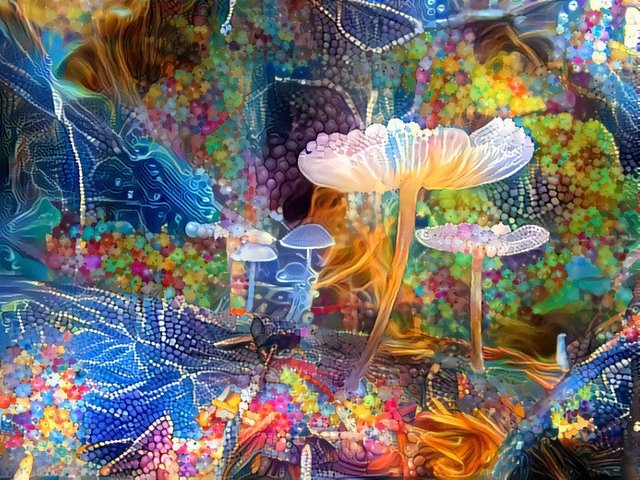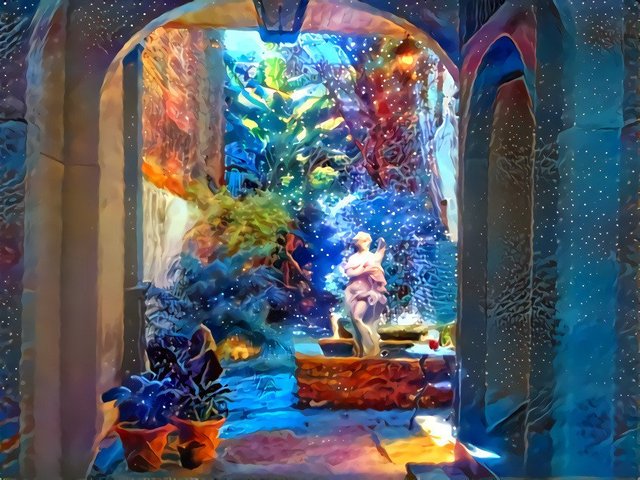On Psychedelic Drugs and Happiness
 All artwork herein by the wonderful Pineal Colada. Buy her work here.
All artwork herein by the wonderful Pineal Colada. Buy her work here.
A sensation of well-being and renewed life flowed through me. Breakfast tasted delicious and gave me extraordinary pleasure. When I later walked out into the garden, in which the sun shone now after a spring rain, everything glistened and sparkled in a fresh light. The world was as if newly created. —Albert Hoffman, recalling the morning after he took the world's first intentional LSD trip
As Aristotle observed some 2,300 years ago, everything we do is aimed at increasing our own happiness. All of our particular desires are but a subset of this singular, overarching aim. All of our varied goals are but instrumental toward this one ultimate end. It is the only truly intrinsic good. Happiness is what we live and strive for.
And, as it happens, psychedelic drugs can deliver it like simply nothing else can.

Consider, for example, the Amazonian entheogenic brew ayahuasca. Within the syncretic Brazillian religion of Santo Daime, it is simply referred to as Daime (Portuguese, "give me"), as in, "give me peace," "give me joy," etc.
And it rarely disappoints.
Ayahuasca has been shown to have a protective psychological effect. Its structred and consistent long-term use is associated with near-complete remission of psychopathologies, improvement in cognitive function, a greater sense of life purpose, and a significant increase in well-being. Similiar results have been achieved with the mescaline-containing peyote.
And so it is with LSD and "magic mushrooms." A recent study found a single dose of LSD continued to promote a greater sense of well-being two weeks after the experience. Another study found the same a full 14 months following a single psilocybin dose (psilocybin is the active alkaloid in magic mushrooms). Finally, in a 25-year follow-up to the famous "Good Friday Experiment," participants still rated their participation in the psilocybin study as one of the most spiritually significant and personally meaningful experiences of their lives and insisted it continued to afford them a deeper sense of life satisfaction.
What else could you possibly do today which will continue to benefit you in terms of day-to-day well-being weeks, months, or even decades from now? I, frankly, cannot think of anything. There is simply no surer, swifter, and more enduring way to increase happiness than the judicious use of psychedelic drugs.

Whence psychedelics happiness-boosting capability? In a word (or, two words, as it were):
Psychedelics make life more interesting and more beautiful.
And not just while you are on them. It lingers.
Psychedelics, psychologists have found, increase the personality trait of "openness." (This is a relatively impressive thing in of itself given it had formerly been thought personality was relatively fixed at adulthood). Openness, among other things, relates to one's aesthetic sensitivity and intellectual curiosity. And a higher degree of openness, in turn, is associated with a greater sense of well-being.
So, again, a concise (if albeit oversimplified) explanation of psychedelics ability to enhance well-being over the long-term: the post-psychedelic world simply presents itself as more interesting and beautiful.
There is something decidedly child-like about the shift. It's subtle, but it's there. And, delightfully, with this heightened sensitivity to elegance and intrigue comes a lighter trigger to feelings of awe and wonder.
It is simply a difficult thing to feel blue when wearing rose-tinted glasses.

Prohibition is a grievous injustice. It robs us of the surest means for securing that which we all want ever-more of.
And note the foregoing primarily speaks to the more or less normal and relatively healthy among us. For those suffering from any of the myriad of chronic and debilitating disorders psychedelics can successfully treat (for example, depression, PTSD, addiction, or cluster headaches) the potential gain in well-being is tremendous—indeed, often life-saving. In such cases, the wickedness of prohibition can scarcely be overstated.
Moreover, we have yet only discussed the benefit of psychedelics to the user himself.
The legal availability of psychedelics will usher in a host of additional, cascading positive effects. Most immediately, if through the use of psychedelics a person, for instance, overcomes a major depressive episode or an addiction, or even a lesser psychopatholoy or neurosis—or he simply becomes a little more tolerant, loving, and pleasant to be around—then certainly this will be a subtle or conspicuous boon to those around him.
And there are more indirect benefits to society. Psychedelic use promotes a keener sense of environmental obligation; the psychedelic-user, for instance, will be slower to flick his cigarette butt out the car window than his non-using counterpart. Finally, and significantly, because psychedelics objectively and markedly increase creativity, their prohibition retards the socio-technological evolution of humanity (as I further discuss here). An anecdote along these lines in closing:
When I was in law school I worked with the Innocence Project. The Innocence Project seeks to exonerate the wrongly convicted through the use of newly available DNA analyses. It occurred to me one afternoon that of the two major Nobel Prize-winning scientific breakthroughs which made our work possible, both have famously been attributed to insights gleaned while under the influence of LSD; Francis Crick's discovery of the double-helix nature of DNA, and Kary Mullis's invention of the polymerase chain reaction technique.
If LSD, or psychedelics generally, indeed have a spirit —as many users are wont to attribute to them—then surely it is one of truth, freedom, and progress.
The post-prohibition world will be a palpably happier, healthier, and more beautiful world.
I am a lawyer and writer with a forthcoming book tentatively entitled, "PSYCHEDELIC REVOLUTION: Living Better with Psychedelic Drugs and Why Prohibition is Unconstitutional." See here for a transcript of a talk I recently gave outlining parts of the central theses of this book.

Psychedelics are some of the highest sheduled drugs around the world yet have some of the lowest instances of negative impact on the human body when compared to leagla substances like alcohol, cigarettes, and more importantly pharmaceutical medicine.
The LD50 on on some of these psychoactive materials such as cannabis and dimethyltryptamine (etc.) is so low in fact that it is far more dangerous to take aspirin than the aforementioned materials, and yet society vilifies psychedelics and claims it is of "no medical benefit".
What I believe is feared, is that those who interact with these materials will gravitate towards a greater sense of autonomy and self congruence, meaning that critical thinking will awaken us to the charade of modern society. Hence , why it is classed as a schedule 1 material, the fear is to have a society of "free thinkers" which will resist the powers that be...
Your post was upvoted by the Copes Upvote Initiative. My account was delegated 5000SP for one month by Make a Minnow on the P.A.L Network. This has increased my voting power to more than 10 times what it normally is, with some assistance of my Superfriends over on Helpie the Copes Upvote Initiative was created for a limited time, please check out the programs which made this possible and for your chance to be selected to have 5000SP delegated to you.
Much love in your direction
~ Cope
Thanks! Will do! And, yes, I am sure there is something to your theory...
Excellent article, well-drawn, and I agree with your conclusions. I am certain, subjectively, that psychedelic experience has dramatically improved my own life, expanded my comprehension immeasurably, and still impacts my moment to moment experience of life as it unfolds, decades since my primary psychedelic experiences. There is immense power in the psychedelic experience – and your utilisation of the cautionary ‘judicious use’ is absolutely key here. Your presentation is overwhelmingly positive – and ‘judicious use’ justifies that positivity. But there is a universe of problems/dangers/pitfalls accessible through the ‘injudicious’ use of psychedelics. I have met many people who I would consider the ‘victims’ of such. I would absolutely argue that ‘state regulation’ is rarely anything but an unmitigated disaster when it comes to this issue – and I look forward to reading any future work you share on this subject – but I would very much like to hear you expand on what you think is indeed ‘judicious’, what are the pitfalls and dangers, and how we can combat/avoid those in a future time that I see as fast arriving; when psychedelic use is indeed decriminalised across the board, and potentially, casualties begin pouring in from ill-considered and ill-informed ‘experimentation’. Db